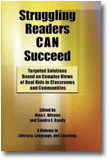
Struggling Readers Can Succeed
Teaching Solutions Based on Real Kids in Classrooms and Communities
Edited by:
Nina L. Nilsson, Saint Joseph’s University
Sandra E. Gandy, Governors State University
A volume in the series: Literacy, Language and Learning. Editor(s): Claudia Finkbeiner, Universitaet Kassel. Wen Ma, Le Moyne College.
Published 2013
In spite of No Child Left Behind and the support provided by Response To Intervention, significant numbers of students continue to struggle with literacy. This text addresses learning-related needs of individual students in addition to interventions for the challenges they face. Struggling readers represent many different ethnicities, socio-economic levels, languages, and dialects in any combination and possess an even wider variety of social, cultural, motivational, literacy, and real world experiences. Through the presentation of case studies, this book considers these factors and their influence on literacy development and suggests ways to adapt research-based instructional strategies and approaches, as well as classroom practices to address them. It also includes related recommended resources. The text appeals to the concerns of classroom teachers, reading specialists, and faculty in teacher education programs, as well as anyone looking for practical, research-based ways to further the literacy development of individuals who struggle to read.
CONTENTS
Foreword . Introduction. Bradford Holt and How Money Matters in Learning to Read, Catherine Compton-Lilly. Changing Outcomes in Reading for Bryant, an African American Urban Learner: A Case Study, Doris Walker-Dalhouse and A. Derick Dalhouse. The Many Faces of Dane: Viewing Boys as a Resource in Their Own Literacy Development, William G. Brozo. Striking a Balance: Implications for Struggling Readers’ and Writers’ Classroom Immersion in the New Literacies, Francine Falk-Ross. Could Abby Have Dyslexia? A Long Journey to Confidence, Erika S. Gray and Allison Ward Parsons. I Read Only Dog Books! Engaged Reading for Students on the Autistic Spectrum, Barbara Ann Marinak, Linda B. Gambrell, and Jacquelynn A. Malloy. Yolanda: Cultural Differences as a Resource for Literacy Learning, Christopher J. Rivera and Kimberley Kennedy Cuero. What Works for Ramon and Other English Language Learners, Sandra E. Gandy. Developing Young Children’s Multifaceted Understandings of Writing, Julie K. Kidd and M. Susan Burns. After School Programs: Literacy Opportunities for Deshawn and Other Struggling Adolescent Readers, Roberta Linder. Changing Preservice Teachers’ Deficit Beliefs and Attitudes Toward the Literacy Abilities of Tamika and Susana, Nina L. Nilsson. About the Editors.
-
Paperback9781623961800
Web price: $45.04 (Reg. 52.99)
-
Hardcover9781623961817
Web price: $80.74 (Reg. 94.99)
- eBook9781623961824

- EDU029040 - EDUCATION: TEACHING METHODS & MATERIALS: Social Science
- EDU040000 - EDUCATION: Philosophy & Social Aspects
- EDU018000 - EDUCATION: Language Experience Approach
-
 Authentic Voices
Culturally Responsive Teaching and Learning
Authentic Voices
Culturally Responsive Teaching and Learning
-
 Collaborative Learning in a Global World
Collaborative Learning in a Global World
-
 Educational Practices in China, Korea, and the United States
Reflections from a Study Abroad Experience
Educational Practices in China, Korea, and the United States
Reflections from a Study Abroad Experience
-
 Innovative Approaches to Teaching Multilingual Students
Innovative Approaches to Teaching Multilingual Students
-
 Listening to the Voices of Boys
Exploring the Motivation of Primary Boys to Engage in Reading
Listening to the Voices of Boys
Exploring the Motivation of Primary Boys to Engage in Reading
-
 Reconceptualizing Literacy in the New Age of Multiculturalism and Pluralism
2nd Edition
Reconceptualizing Literacy in the New Age of Multiculturalism and Pluralism
2nd Edition
-
 Views from Inside
Languages, Cultures, and Schooling for K‐12 Educators
Views from Inside
Languages, Cultures, and Schooling for K‐12 Educators

